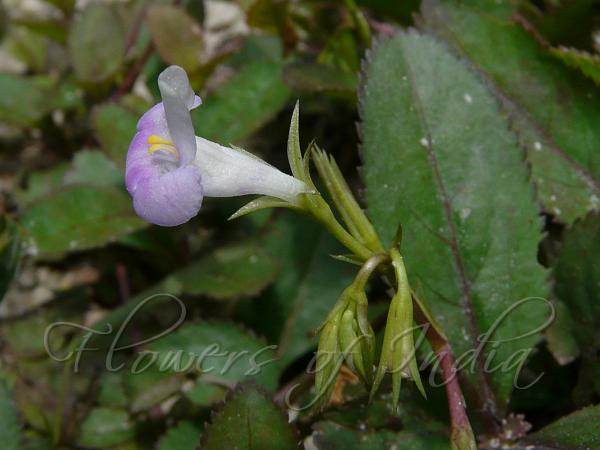|
| Duckbill Lindernia |
|

|

| File size | 397374 |
| Original date | 5/29/19 10:03 AM |
| Resolution | 2560 x 1920 |
| Flash | Flash did not fire, auto |
| Focal length | 6.3mm |
| Exposure time | 1/320s |
| Aperture | 5.6 |
| Focus Distance | |
| Metering Mode | Spot |
| Camera make | Panasonic |
| Camera model | DMC-FZ18 |
| Sensor type | OneChipColorArea |
|
|
|
|
Photo: |
Botanical name: Bonnaya ruellioides Family: Linderniaceae (Lindernia family)
Synonyms: Lindernia ruellioides, Lindernia reptans, Bonnaya reptans
Synonyms: Lindernia ruellioides, Lindernia reptans, Bonnaya reptans
Duckbill Lindernia is an annual herb, 10-15 cm tall. Stolons to 30 cm.
Stems rarely erect, usually branched, rooting from nodes. Leaf stalk 0.3-2
cm, distally thicker. Leaf blade oblong, elliptic, ovate-oblong, or
circular, 1-4 X 0.6-2 cm, base nearly stem-clasping or broadly
wedge-shaped. Leaf margin above base densely and regularly acute-serrate.
Flowers occur in 2-10 flowered racemes at the end of branches. Flower
stalk is short, distally gradually thicker. Flowers are purple-reddish
white, 1-1.4 cm. Flower tube is 7-9 mm. Lower lip 3-lobed, lobes nearly
equal or middle lobe slightly larger than other lobes; upper lip 2-lobed.
Two fertile stamens peep out of the flower. Stigma flattened. Capsule
conical, 2 time as long as persistent sepals. Seeds brown, ellipsoid.
Duckbill Lindernia is found in the Himalaya, at altitudes of 200-1500 m.
It is also found in Western Ghats, Burma, S. China and S. Japan, Malaysia.
Flowering: May-September.
| Identification credit: Akramul Hoque | Photographed in East-Siang distt., Arunachal Pradesh & Imphal, Manipur. |
• Is this flower misidentified? If yes,